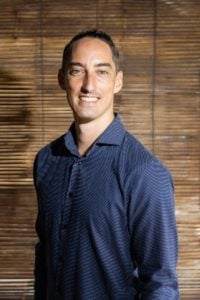
Two career paths for Eastern Washington University (EWU) faculty member Nicholas Swope began in East Asia a decade ago.
“I joined the Peace Corps and served in a rural hospital in Mongolia,” he said. “Even though I was doing a lot of public health and work within the hospital, I also had the opportunity to do a lot of teaching.
“That planted the seed for both public health and my enjoyment of teaching. My wife, Heather, and I did the Peace Corps together. Within our little community, a couple of times a month we would run lessons on life skills.”
Swope now teaches multiple courses in the online Master of Public Health (MPH) – General program at EWU, where he is in his fifth year teaching at the university and third year as a full-time faculty member.
“It’s a great opportunity to help students develop their skills and allow them to guide their own learning process,” he said. “I am there to assist in whatever way they see fit.
“One of the courses I teach is Epidemiology. After the course, I normally have a handful of students tell me, ‘I would love to do epidemiology as a career. What would you recommend I do with the rest of my time in the MPH program to make sure I can build the skills I need to find an epidemiology job?’ I like working and coaching students to help them find what they’re passionate about in public health.”
In the Forefront
Swope is from Salem, Oregon, and graduated with a bachelor’s degree in economics from the University of Oregon in 2008. He added a master’s degree in public health education and promotion from Western Illinois University seven years later.
“Before I switched to public health, which I love, my background was in business and economics,” he said. “I spent time in China doing business and sports marketing before the 2008 Beijing Olympics. It was an excellent opportunity, but it didn’t pull my heartstrings in the direction I wanted to go. I worked for AmeriCorps when I got back home.”
With so much emphasis on public health in contemporary society, Swope said that adjustments to the curriculum of the online Master of Public Health program were positive.
“We completely restructured our program during the pandemic,” he said. “We were able to update all of our courses. Almost all of the final course projects have a tangible component.
“In [one] course, students have to produce a full, community-wide public health report and analysis as if they were responding to a global outbreak of a new contagion. It is built and based completely off what public health districts had to do in response to COVID-19.”
The entirety of the coursework in the online MPH program includes practical elements and real-world application, according to Swope.
“The Program Planning, Evaluation and Process Improvement course is specifically designed to go through the main stages of program planning and development, where students start by assessing the needs in their community and then actually going through and developing and implementing their own program plan to a small test group,” he said. “They then evaluate data and make changes and updates based on that data.”
Here, There, Everywhere
Especially since Swope remains a world traveler who recently took surf lessons in Indonesia, he enjoys the diversity of students in the master’s program. He and his wife also have a daughter and a son.
“I have always learned something from our students in every class I have taught,” he said. “That’s another large strength of our program. In the same group of students, you may have a student who went straight from undergrad into our Master of Public Health program.
“In that same group, you may have a professional who may be a doctor in their country who is getting their Master of Public Health in America. You may have a hospital administrator who wants to improve and get a graduate degree.
“They are all viewing the same assignment from a different lens. They are able to work together, collaborate, discuss, and it adds a whole Technicolor to the program that could be missing in different areas.”
Because of the pandemic, Swope said that EWU’s online Master of Public Health program has seen an uptick in enrollments given international demand for public health professionals.
“It’s probably two-fold in that public health is very present in contemporary culture, but another factor is that our program completely restructured itself to be an accelerated program that uses contemporary content and allows students to complete their master’s degree in a more condensed fashion,” he said. “That is also more appealing to students.”
Swope said that the most important advice he can give students in the program is to have good time management and communication skills.
“Our entire teaching faculty have families and a lot of competing priorities,” he said. “By setting up a strong dialogue with us, we can always make things work.
“By far, the best success I have seen with students working has been setting out structured times for work, school and…to allow themselves to turn off and unplug to refresh themselves for whatever challenges are coming up.”
The flexibility of the program is also key to students who might have to put school on hold when life gets in the way. Swope hopes to continue riding the wave of public health and education and guiding students for as long as he can.
“Our students can choose to go full time…or they can go one course at a time,” he said. “That’s a huge advantage that I don’t see in other Master of Public Health programs. People can jump in and out of our carousel. That’s so important for our working students.”
Learn more about EWU’s online Master of Public Health – General program.